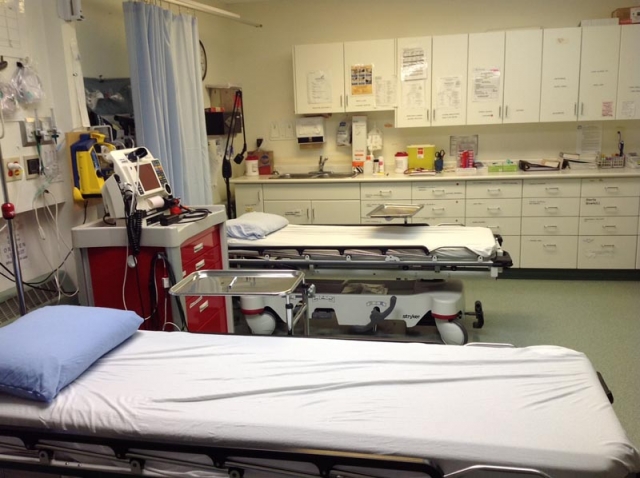Critics say reduction of Kaslo ER hours a definite step in wrong direction
A reduction in hours at the Victorian Community Health Centre emergency room is a permanent and necessary change according to the Interior Health Authority (IHA).
Last week the IHA met with more than 400 North Kootenay Lake residents to hear their views on the new hours, which takes affect November 2.
The ER, which serves about 2,500 people in Kaslo and surrounding communities, will change from being opened 24 hours a day, seven days a week to a Monday to Friday, 9 a.m. to 5 p.m. facility.
The emergency facility will even be closed on statutory holidays.
“The purpose of the meeting was to share our service plan and listen to the views and concerns of the community,” said Dr. Allan Stewart, senior medical director for community and residential services at IHA.
“We were clearly able to express the issue so the meeting was successful in hearing the concerns.”
Central Kootenay Regional District Area D director Andy Shadrack says just hearing the community’s concerns is not enough.
“From my perspective IHA has not thought things through like road closures, power outages and storms,” said Shadrack, who has lived in the community for 25 years and is a member of the West Kootenay Boundary Hospital Board.
“We have people who live an hour away from Kaslo. That’s a one-way trip. If we have an ambulance going there and back, that is two hours long.”
Shadrack fears the long-term ramifications of this 80 per cent reduction in health care services will have an affect on businesses development, tourism and the population of the community.
“We are asking to be able to negotiate,” said Shadrack. “We want to save the basic front line health care services because of time and distance . . ..
“How do you attract tourists to come to the area where there is no health care 80 per cent of the time?”
Nelson MLA Michelle Mungall has written the Minister of Health, Dr. Margaret MacDiarmid asking for a delay in the decision until all alternatives have been reviewed.
“The communities of North Kootenay Lake have endured a lot of hardships recently” said Mungall in a recent press release.
“Losing a 24-hour emergency room service in Kaslo is not acceptablee.”
A shortage of medical staff driving decision
The Interior Health Authority said the reduction is in reaction to challenging staffing issues.
Currently there are 1.5 full time equivalent (FTE) doctors on staff in Kaslo, although there is funding for two FTE.
Three part-time physicians work those positions. But, as of December, the centre will be down to one FTE being filled by two physicians, and then back up to a full two FTE in January when it is hoped a new doctor will arrive in the community, said Stewart.
“We have to respond to the external environment — and there is a shortage of healthcare providers,” said Stewart.
“We’re preventing the determent of all the physician staffing there by making it a more sustainable model . . .. We’ve been struggling for some time to get a full compliment of physicians there but the problem is growing and we could lose the physicians that are already there.”
“I’m not arguing that we drive our doctors into the ground by overworking them,” said Shadrack, who wishes the community had been consulted before the decision was made so they could contribute alternative ideas.
Nurses union fears similar fate for other remote communities
The BC Nurses Union (BCNU) West Kootenay chair Tina Coletti is appalled at the decision warning that this closure is setting the stage for other remote BC communities.
“If this actually happens, it is a threat to every single remote community in BC,” Coletti told The Nelson Daily while she was visiting Kaslo on Monday, (September 17).
“I see this happening to New Denver and to Nakusp. There are solutions that exist like nurse practitioners . . .. This is such a threat to the safety of the citizens who live here.”
Coletti said the nurses who work at the Victorian Community Health Centre are “concerned for people’s safety”.
“(This decision) is not apart of a plan to do something similar, this was a unique circumstance,” assures Stewart.
Coletti, the BC Nurses Union West Kootenay chair, said the recruitment process is flawed, as is the data that IHA used to change the ER operations.
“They are making a decision using bad information,” she said.
“I think the politicians have some great strategies to keep the facility open,” said Coletti, adding nurses are willing to be apart of the solution.
“I have confirmed all the nurses are prepared to do advanced training to provide services as part of a whole solution, rather than a closure. Nurses are prepared to work with physicians remotely.”
She said other remote communities across the country already embrace modern technology to deliver health care like nurse led assessments alongside remote physician consultation via video conferencing.
Stewart said the region is also short on nursing staff, which also contributed to the decision the IHA had to make.
However, once this closure takes affect, five of the RNs who work at the centre will be laid off because they won’t be needed there, said Shadrack.
To fill in for the gaps in emergency services, IHA will be establishing a larger ambulance service in Kaslo, which will include a newly created crossbreed of trained personnel called an advanced care attendant.
The position requires specialized training as both a care aide and a paramedic, said Stewart.
They will be able to work in palliative care at the care centre in addition to providing front line care during emergency situations.
“Having this position in residential care is innovative,” said Stewart.
























Comments